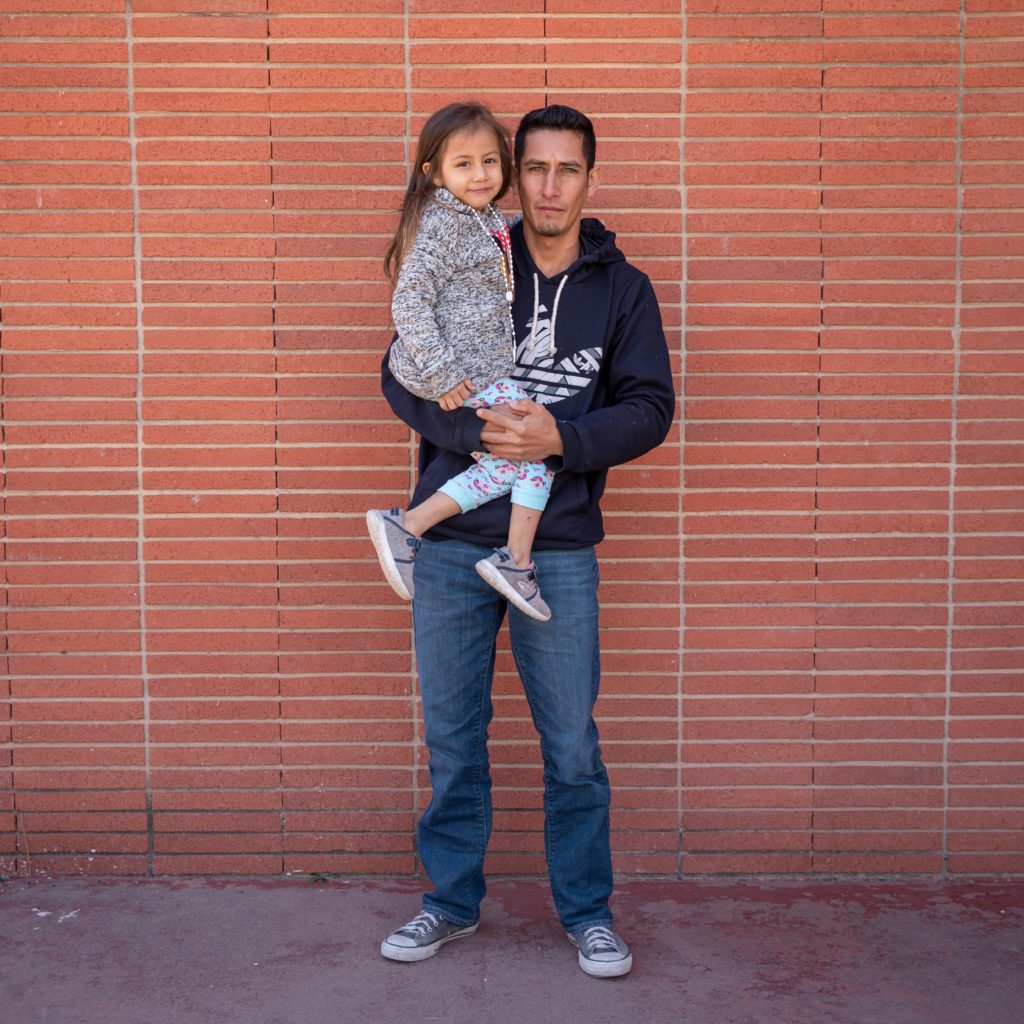Darwin Jose Baharona, 32, from San Raphael in the department of Lempira in Honduras came to the United States with his daughter Briana, 4, and were given hospitality at Holy Cross Retreat Center in Las Cruces, via the Project Oak Tree program which assists migrants when they are released from immigration detention.
Back in Honduras, Darwin worked in agriculture, earning about 120 lempiras ($5) per day. Paying for the costs of going to school as well as all of the costs of living was difficult on such a small budget. Now separated from his ex-wife, he takes care of his daughter on his own, and the difficult choice to come to the United States was made out of necessity. His parents, who he lived with, stayed back in Honduras, and he hopes to assist them with the cost of life if given the chance to work in the United States.
In addition to economic difficulties, Darwin said that crime is unfortunately a part of daily life. Robberies and muggings are common, and there is no chance for justice. “If someone goes to the police, they don’t do anything,” he said, describing being mugged in the past.
Darwin and his daughter came through Mexico with the help of a Coyote. Many Central Americans decide to do this to avoid putting themselves at risk of kidnapping and extortion, along their route. This service, however, is not cheap. Darwin paid about $6000 for him and his daughter’s trip.
After leaving Holy Cross Retreat Center, he would head to Houston, Texas by bus, where a friend of his will receive him. He hopes to have the chance to work and for his daughter to go to school. However, the reality is not so simple, he must first visit the ICE field office where he hopes they will take off his ankle monitor, “They say that with luck, they take it off quickly.”
Darwin Jose Baharona, 32, es de San Rafael, Departamento de Lempira en Honduras y llego a Estados Unidos con su hija Briana, 4, y les dieron hospitalidad en el Centro de Retiro de Santa Cruz en Las Cruces, por medio del Programa de Project Oak Tree, la cual asiste a migrantes cuando la detención migratoria los pone en libertad.
En su país de Origen, Darwin trabaja en la agricultura, ganando 120 lempiras ($5) por día. Pagando los costos de educación al igual el costo de vida, era difícil en un presupuesto reducido. Ahora separado de ex-esposa, él cuida de su hija el solo, and la decisión difícil de venir a los Estados Unidos, fue por necesidad. Sus padres, con los cuales él vivía, se han quedado en Honduras, y espera ayudarlos con los costos de vida, si le dan la oportunidad de trabajar en los Estado Unidos.
En adición a las dificultades económicas, Darwin dijo que el crimen es, desafortunadamente parte de la vida diaria. Robos y asaltos son muy comunes, y no hay oportunidad de justicia. “Si alguien va a la policía, no hacen nada,” dijo el, describiendo como había sido asaltado en el pasado.
Darwin y su hija pasaron por México con ayuda de un Coyote. Muchos Centroamericanos deciden hacer esto para evitar ponerse en riesgo de secuestro y extorsión, durante su viaje. Este servicio, sin embargo, no es barato. Darwin Pago más o menos $6,000.00 por el viaje de el y su hija.
Después de dejar en Centro de Retiro de Santa Cruz, se dirige a Houston, Texas por autobús, donde un amigo lo esta esperando. Espera tener la oportunidad de trabajar y de que su hija pueda ir a la escuela. Sin embargo la realidad no es tan fácil, primero tiene que presentarse en las oficinas de ICE donde espera que le puedan quitar la pulsera de tobillo. “Dicen que con suerte, te lo quitan pronto,”
The Faces of Immigration Project is a 40 Day photo journal series used to highlight the stories of all Immigrants. The project is meant to shed light on some of the many reasons people have for immigrating to the U.S. Statements and stories have been edited for content, clarity, and brevity and may not reflect the entirety of an Immigrant’s reasons for immigrating to the United States.
By Paul Rje

